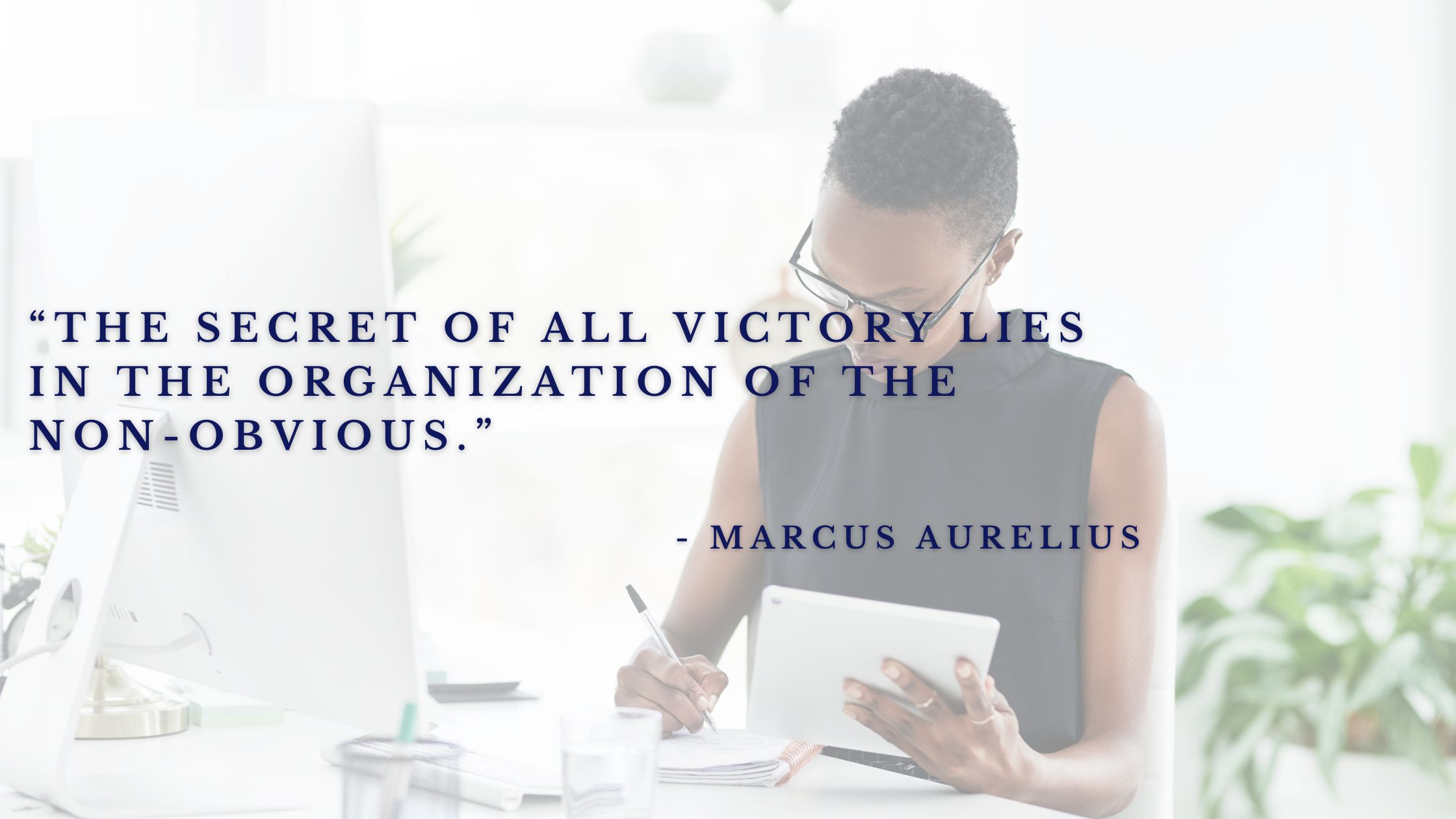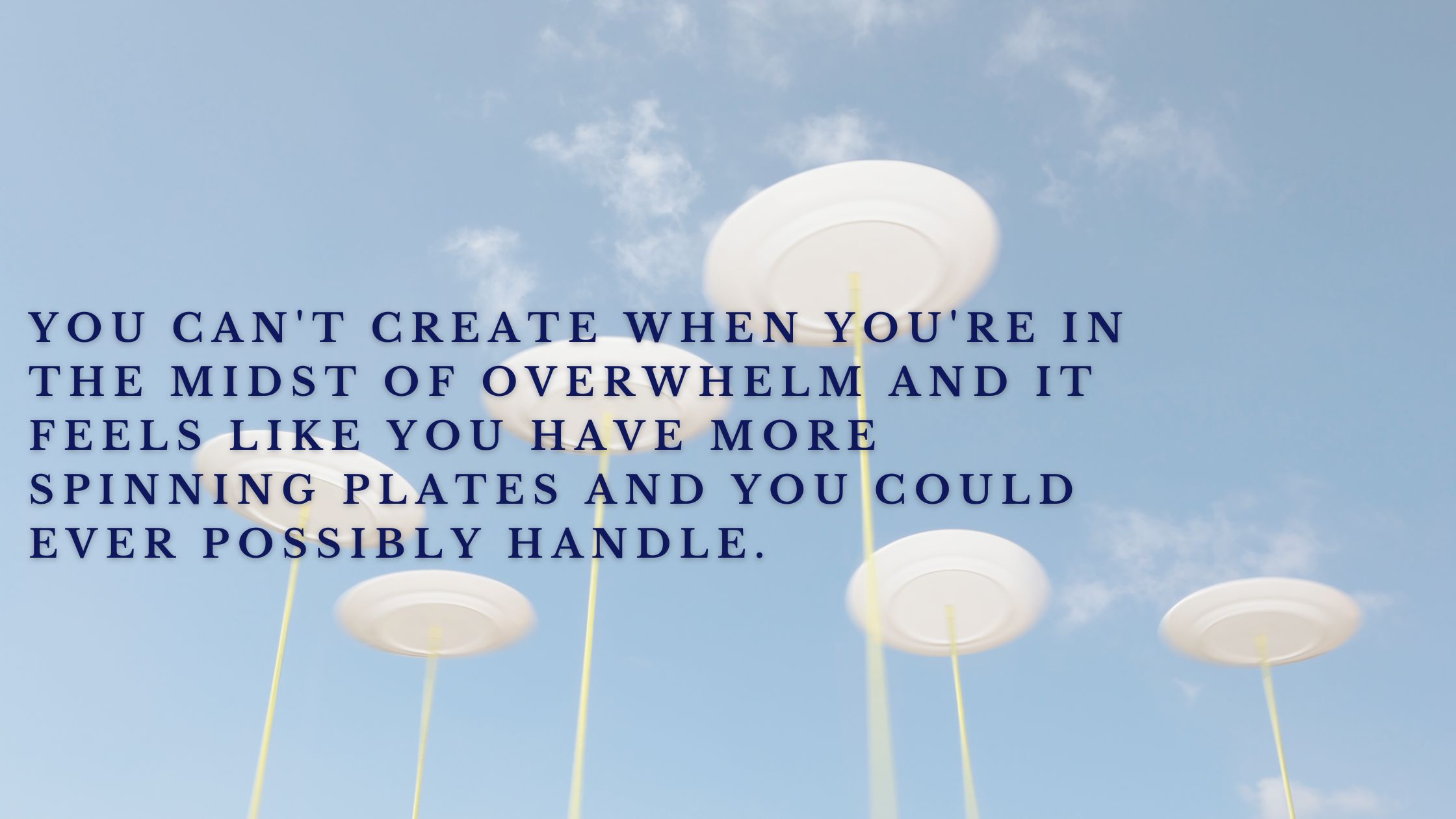
How to Give Yourself The Edge in Business
Nov 09, 2022One of the biggest things I see is that most entrepreneurs lack that one vital thing that gives them an edge in their business. And that is organization.
So today I want to share with you some of my tricks and tips that you can dive into to get yourself more organized and give yourself that edge in business.
How organized are you on a daily basis?
How often as a business owner do you consider how organized you are day to day? If you feel like a hot mess most days then do you know how much your mess might be costing your business or even messing it up completely?
Creating systems within our business are essential if we want to grow and scale but creating systems doesn't have to be complex or refined to be able to work. It's often non-obvious tasks that are really make the difference, especially in business. But why is that? How can organisation actually give you a winning edge in battle?

So let's say you have a flower shop, and your competitor's flower shop is just across the street, you both have really amazing flowers and designs. So which flower shop do the customers go to? Do they go in the one that happens to be close by as they're walking past it? Or do they go to that flower shop that consistently has their floors mopped, their countertops are clean and beautiful. And the flower bouquets are put together in a timely manner and beautifully presented. And where the person at the front always greets them by name and waves goodbye to them as they go out the door.
You see, most of us assume that all these tasks are a given.
We take for granted good customer relationships, to have timely reports. And to have just the basics covered but all of this is not accomplished by magic. A good system creates that atmosphere.
A good system requires organization. These are the small details that make all the difference.
Customers aren't often even aware that they're choosing one business over the other based on how well organized it is. And just one detail falling through the cracks can often be a prospects deciding factor.
I would always tell my team, 'they won't notice everything that you do right, but they will notice just one thing that you do wrong'.
How can you improve organization in your business?
We tend to think that being organized or building productivity is not creative, and not really fun. It's conformist and boring. In fact often we set out as entrepreneurs to escape being boxed in especially as creatives.
But having organization is actually what allows us to the freedom to do our best, most creative, amazing work.
For example, I want you to imagine that you're attending two different events. One workshop is extremely well organized while the other is not.
At the extremely well organized event or workshop, you know which room you need to go to, and at what time. If you get lost, there's a volunteer who knows where you're supposed to go. And when you watch the speakers, you have the feeling that they had time to get familiar with the stage long before they ever needed to perform on it.
Now, at the unorganized event, you got lost constantly, you can't understand the event map. And by the time someone figures out where you need to go, your session is already half over. Even the speakers are frazzled when they're actually delivering their messages.
Which event has the most impact on its attendees? When you get the little details right it allows your brilliance to shine through and create the richest experience imaginable. That's what great organization can do for you.
Creating systems for those non-obvious details can free up your business to new opportunities, people and profits. And it also frees up your mind from the clutter that piles up.
Time has a tendency to slip through even the stickiest fingers. Once you've lost it, you can't gain it back. But by learning to streamline your time, you have more of it. And I'm going to show you how with some techniques we've often learned in our personal life but never applied to our business life.
Here's an analogy for you. When you come through the front door, do you always put your keys in the same place? If you haven't done it before, you could try it. And if this is already common practice for you take a moment to consider how much easier it makes your life. Just this simple system helps you to eliminate wasted time and energy spent looking for your keys.
So how do we start to eliminate similar distractions within our business? Here's an example I would love to try out - build a practice where whenever a client calls, you reach for the same notebook to take notes. In that way, all your client notes are in one spot. Always leave the notebook in your same spot in your office or by the phone or on your workbench, wherever it works for you do it until it becomes an automatic reaction. That's a practice you can create.
An imperfect system is better than no system at all. Sometimes we can fall into the trap of obsessing on a perfect way to do something that we don't even create that system at all or we give up on a current system just because it's not the ideal way we envision doing it.
Let's look at the previous example of writing all your client notes in one notebook. What if you ended up reaching for the wrong notebook? Or you take a call while sitting in your car and write in a notebook that's meant for your gas mileage? Or what if in the process of building this practice, you end up with 20 different notebooks instead of one? Well, that means you'll waste time searching through all those different notebooks to find notes that you need BUT at least you know where they are so that you know where to start looking.
And there's nothing to stop you building and improving on a system that you put into place. So for years, I would keep all of my financial documents in one folder with the name of the year on it. And when there's a new year I just switched to a new folder. I used to think that I was probably screwing things up because I didn't make folders based on the types of documents at first. I just threw them all in the same folder and then change the folder when the new year came round.
I thought my documents were a complete mess until I needed to find a copy of my car loan. At first I was panicked because I didn't know I'd put it. So I looked in the folder from the year that I bought my car. And guess what there it was. So it's very easy to stop ourselves from taking any action just because we think we have to come up with the best possible system.
Having one folder for the year was good enough for me, then it was much easier to look in that folder and marked for the year that I bought my car than a giant stack of documents that just piled up by the filing cabinet, a pile that I didn't touch because either I didn't know what to do with them, or just didn't have time to deal with it at all. So I just created a system. And since then I have added to that system and created more files that break my documents down into categories, a folder where things need to go into until they get filed quarterly and eventually I was bale to hire someone to help me in my office with all my paperwork.
But if I had never taken that first step of creating a simple system for me to get into the habit then I would have never been able to start finessing it and expanding it to be a system that really supported me in saving time and energy.
Here are some suggestions for easy systems you can start implementing today:
- A box of receipts is better than throwing away your receipts.
- A poorly named google doc is better than a scrap of paper that you could easily lose.
- Putting together a business binder for all your important notes
Any system is better than no system. And any place is better than no place at all.
As a species human beings are not built for long term thinking. We can be brilliant long term thinkers but this is not our natural mode as human beings.
There are so many things we do that we know were terrible long time decisions, but are very appealing short term decisions. We'd rather toss a piece of paper in a drawer, and we're leave it on the floorboards of our car, then take 10 seconds to think about where does it go.
We're not geared to focus on the long term. And building systems for your business is a long term goal. We don't like to do it, we think it's difficult and we build all sorts of excuses and resistance to avoid doing it.
You might find yourself saying things like, 'this is gonna take me so long to set up', 'it's a waste of my time'. Or, 'I know I'm going to take an extra five minutes every time I do this but this is easier. It's just five minutes...I don't have to come up with the system'.
And you know what? Those five minutes accumulated over time equals hours of your life that are just wasted simply because you let short term satisfaction outweigh long term benefits. Even if it takes you all day to put a system in place. It's worth it in the long term. And that's how most systems are.
But you have to consciously cultivate the habit of organising your business. And you have to make a practice of noticing when your mind favours short term thinking over long term thinking because you're going to do it all the time. It's human nature.
When working with a team, if you have a piece of information, even a small piece that you aren't sure people need to know, go ahead and share it with your teammates. You don't have to get people's feedback or people's opinion about every piece of information.
And you must make sharing as many pieces of information with as many people as possible as your default mode of sharing. Why? Because when people have access to all these pieces, things happen very quickly. Oversharing makes sure that when someone is making a decision, they're not doing it on limited information. They'll make a decision based on the overall vision of the company and where all the team members are at.
Now oversharing doesn't mean oversharing things about how you personally how you feel about something. We're talking about oversharing the projects that your team is working on having things like a business binder or Google Docs or a project management platform where everybody can see what everybody else is doing and it allows the whole team to be able to work quicker.
When all the information stays in just your head or one of your team's heads then you waste so much energy trying to keep it all straight. It's essential to keep track of the decisions you've made on a subject.
For instance, in the earlier workshop event example I gave you, no one can enjoy the workshop unless all those little details have been taken care of. Your mind can't fully enjoy and fully dig into the time that you have for your areas of brilliance. If your brain is always churning in the background, working to keep track of everything. Trying to remember, everything you need to do, all at the same time you carry the fear that the whole thing is just going to come crashing down any minute. It's a terrible stifling feeling, and it contaminates everything you do.

I know it can feel like a Catch 22 situation because to get systems in place and get organized you need to take a moment to step back and potentially lose more time in your business but you're going to spend that time stressing and running around like crazy person anyway, right?
The more plates you have spinning and the more information you have in your head, the harder it is to step back and dedicate time to get organised but you have to set aside the focus time that you need and that your business craves.
The point of creating systems is to create a business where you not only thrive and make money, but is also enjoyable to run. Imagine if you actually felt at peace every time you started your workday? When you take time to create peace in your business, the profits follow.
You get to overcome your short term thinking.
You get to commit yourself to build these systems because it doesn't doesn't just happen overnight. It takes work to build and it's worth it.
In fact, getting organized is the highest leverage activity for you increasing the profitability of your business.
Because there are places where not being organised kills your business. For example, not being organised can stop you from returning phone calls, following up with clients or cause you to forget to call a good lead for some new business. Or you may even miss an opportunity because you need a press photo of yourself. And instead of having your photos clearly labelled on your computer, you realise your photos are on a USB somewhere in a box in storage.
There are opportunities that you're choosing to turn down every single day because you're not organized.
Don't invite problems into your business by being disorganized.
Don't let your short term brain say that you don't have time for this.
Don't let it say that this is too complicated. It's not too complicated.
You have to make a choice that this is where you're going to focus your time, and I promise you that you will see some amazing results in your business.
Stay connected with news and updates!
Join my mailing list to receive the latest news and updates.
Don't worry, your information will not be shared.
I hate SPAM. I will never sell your information, for any reason.
